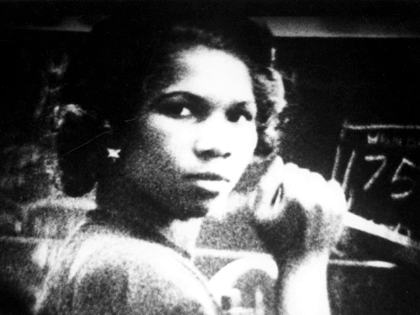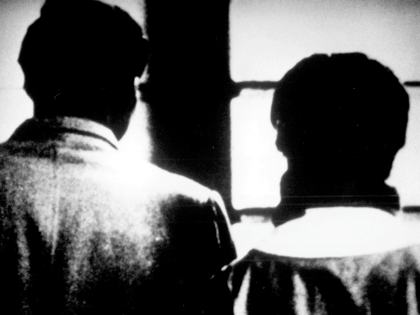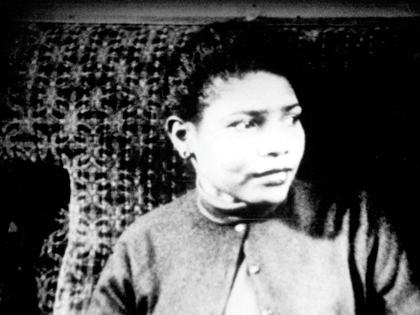Out of the archive
The land still lies:
Handsworth Songs and the English riots

Handsworth Songs
Mark Fisher reflects on a screening of Handsworth Songs, the Black Audio Film Collective’s 1986 essay on black Britain, in the wake of this summer’s new wave of civil unrest
“I’m sure that a group of people who brought the British state to its knees can organise themselves.” So argued John Akomfrah, the director of the Black Audio Film Collective’s Handsworth Songs at a screening of the film at Tate Modern last month. Made for the Channel 4 series ‘Britain: The Lie of the Land’, the film was released in 1986, a year after riots in Handsworth, Birmingham and Tottenham. Not surprisingly, given that the Tate had convened the event as a consequence of the recent uprisings in England, the question of the continuities and discontinuities between the 80s and now hung over the whole evening, dominating the discussion that followed the screening.
Watched – and listened to – now, Handsworth Songs seems eerily (un)timely. The continuities between the 80s and now impose themselves on the contemporary viewer with a breathtaking force: just as with the recent insurrections, the events in 1985 were triggered by police violence; and the 1985 denunciations of the riots as senseless acts of criminality could have been made by Tory politicians yesterday.
This is why it is important to resist the casual story that things have ‘progressed’ in any simple linear fashion since Handsworth Songs was made. Yes, the BAFC can now appear at Tate Modern in the wake of new riots in England, something unthinkable in 1985; but, as Film Quarterly editor Rob White pointed out in the discussion at the Tate event, there is little chance now of Handsworth Songs or its like appearing on Channel 4 now, still less being commissioned. The assumption that brutal policing and racism were relics of a bygone era was part of the reactionary narrativisation of the recent riots: yes, there were politics and racism back then, but not now, not any more…
The lesson to be remembered – especially now that we are being asked to defend abortion and oppose the death penalty again – is that struggles are never definitively won. As the academic George Shire pointed out in the Tate discussion, many struggles have not been lost so much as diverted into what he called “the privatisation of politics”, as former activists become hired as ‘consultants’.

Handsworth Songs
Shire’s remarks strikingly echoed recent comments made by Paul Gilroy. “When you look at the layer of political leaders from our communities,” Gilroy observed, “the generation who came of age during that time 30 years ago, many of those people have accepted the logic of privatisation. They've privatised that movement, and they've sold their services as consultants and managers and diversity trainers.”
This points to one major discontinuity between now and 25 years ago. In 1985, political collectivities were in the process of being violently decomposed – this was also the year in which the Miners’ Strike ended in bitter defeat – as the neoliberal political programme began to impose the ‘privatisation of the mind’ which is now everywhere taken for granted. Akomfrah’s optimistic take on the current riots – that those who rioted will come to constitute themselves as a collective agent – suggests that we might be seeing the reversal of this psychic privatisation.
One of many striking things about Handsworth Songs is the serene confidence of its experimental essayism. Instead of easy didacticism, the film offers a complex palimpsest comprising archive material, an empathic sound design and footage shot by the Collective during and after the riots. The Collective’s practice coolly assumed not only that ‘black’, ‘avant garde’ and ‘politics’ could co-exist, but that they must entail one another.
Such assumptions, such confidence, were all the more remarkable for the fact that they were so hard won: the Collective’s Lina Gopaul remembered that the idea of a black avant-garde was greeted with incomprehension when the BAFC began their work. Even the sight of young black people carrying cameras provoked bemusement: are they real? Gopaul recalled police officers asking as the Collective filmed events in Handsworth and Broadwater Farm 25 years ago.
At a time when reactionaries once again feel able to make racist generalisations about ‘black culture’ in mainstream media, the Collective’s undoing of received ideas of what ‘black’ supposedly means remains an urgent project.
In The Ghosts of Songs: The Film Art of the Black Audio Film Collective, the outstanding survey of the BAFC’s work that he co-edited with fellow Otolith Group member Anjalika Sagar, Kodwo Eshun argued that, for the Collective, ‘black’ “might be profitably understood… as a dimension of potentiality.”

Handsworth Songs
At the Tate discussion, which he chaired, Eshun pointed to the use in Handsworth Songs of Mark Stewart and the Maffia’s dub-refracted cut-up version of ‘Jerusalem’: the track makes a bid for an account of Englishness from which ‘blackness’, far from being something that can be excluded, becomes instead the only possible fulfilment of the millenarian promise of Blake’s revolutionary poem.
The use of Stewart’s music also brings home the extent to which Handsworth Songs belonged to a post-punk moment which was defined by its unsettling of concepts of ‘white’ and ‘black’ culture. Trevor Mathison’s astonishing sound design certainly draws upon dub, but its voice loops and seething electronics are equally reminiscent of the work of Test Department and Cabaret Voltaire.
So much film and television now deploys sound as a crude bludgeon which closes down the polyvalency of images. Whooshing sound effects subordinate audiences to the audio equivalent of a spectacle, while the redundant use of pop music enforces a terroristic sentimentalism. By strong and refreshing contrast, Mathison’s sound – which is simultaneously seductive and estranging – liberates lyricism from personalised emotion, and frees up the potentials of the audio from the strictures of ‘music’. Subtract the images entirely, and Handsworth Songs can function as a gripping audio-essay.
Mathison’s sound recording equipment captured one of the most extraordinary moments in the film, an exchange between the floor manager and the producer of the long-defunct documentary series TV Eye in the run-up to a special edition of the programme which was about to be filmed in front of a Tottenham audience. The exchange reveals that it is not possible to securely delimit ‘merely technical’ issues from political questions. The producer’s anxieties about lighting quickly shade into concerns about the proportion of non-whites in the audience. The matter-of-fact tone of the discussions make this sudden peek into the reality studio all the more disturbing – and illuminating.
The screening and the discussion at the Tate were a reminder that ‘mainstream media’ is not a monolith but a terrain. It wasn’t because of the largesse of broadcasters that the BBC and Channel 4 became host to popular experimentalism between the 60s and the 90s. No: this was only possible on the basis of a struggle by forces – which were political at the same time as they were cultural – that were content neither to remain in the margins nor to replicate the existing form of mainstream. Handsworth Songs is a glorious artefact of that struggle – and a call for us to resume it.
See also
Egypt’s revolutions on film: Omar Kholeif on representations of nationalist revolution in Egyptian cinema (July 2011)
East London on film: Frances Morgan on local portraits at the East End Film Festival (May 2011)
Attack the Block reviewed by Michael Brooke (June 2011)
Lost and forgotten: Mark Sinker on British cinema of the 1970s (July 2010)
Family photos: Sukhdev Sandhu on John Akomfrah’s Mnemosyne (January 2010)
Direct action hero: Tim Lucas on four essay films by Chris Marker (June 2008)
New boots and rants: Jon Savage on This is England (May 2007)
Fear of a black cinema: Amy Taubin lauds Spike Lee’s Do the Right Thing (August 2002)
One deadly summit: Patrick Kennedy on four radical filmmakers’ record of the Genoa anti-globalisation protests (September 2001)
Be black and buy: Ed Guerrero on the emergence of ‘mainstream’ African-American cinema (December 2000)
